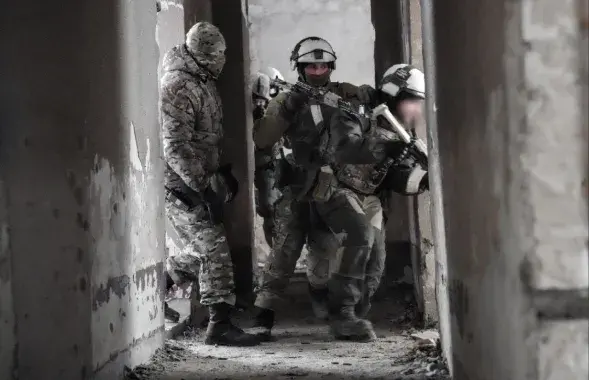Uladzіmіr Zdanovіch: Tests weed out talented entrants
Apart from that the deputy found some suspicious moments in the work of entrance examination commissions and he hopes that the State Control Committee will notice them. The witness of the last week is the head of the Permanent Commission on Education, Culture, Science and Scientific Progress of the House of Representatives Uladzіmіr Zdanovіch. The deputy made a sensational announcement uncovering drawbacks of the entrance campaign to prestigious faculties of higher educational institutions. Entrants who got the lowest passing score and started celebrating their entrance did not become students in the end.
— Uladzіmіr Matsveevіch, what was “the unsound ice” of this year’s entrance campaign?
— There was a general drawback of the whole entrance campaign. It was connected with terms of sending documents. It was announced that the deadline was 6 p.m. July 29. It was difficult to guess whether nobody be allowed to enter universities or institutes after 6 p.m. (the entrances were really closed). Then what was to become of those who were already in? A person is sitting at the table, filling in the forms and they suddenly announce that it is already 6 p.m: “So we will accept your documents but all the others in the queue will have to leave”? There is one more thing.
It is good that all the information was available on the Internet: it was possible to see how many entrants had sent their documents to this or that faculty, what was the lowest and highest passing score and you could assess your chances of entering this educational institution. Information was updated every three hours: at 9 a.m., 12 p.m., 3 p.m. and then at 6 p.m. Everything was perfect except for the last day. People logged in at 6 p.m. and saw that their son or daughter were 14th in the general rating of entrants. They checked the rating again at 11 p.m. and saw that nothing had changed.
Everything was all right. People were sure they had become students. They visited the web site the following morning and saw that there were 20 or 25 people ahead of them and it meant that they failed. There was no openness we needed to have there.
— How did you get to know about such cases?
— A few people turned to me as a deputy and complained that the results on the last day of the elections campaign and on the following morning were not the same.
— In what educational institutions did it happen?
— It happened in different institutions, it mainly concerns prestigious faculties.
— Prestigious… what do you mean?
— I mean international relations, economics and so on.
— What do you think is the reason for it, is it bad work of entrance examination commissions or corruption?
— There could be several reasons. Probably the people responsible for updating the results went home because their working day ended on 6 p.m. So the web site was updated only in the morning. There can be various ideas concerning it and there can be various conclusions.
— Are you planning to turn to the State Control Committee?
— I think they have already read the information in mass media and will make certain conclusions.
— What has to be done to avoid such problems in the future?
— It is essential that those web sites should examine all results they got till 6 p.m. during the following three hours and update the information on the Internet.
Let us remind you, I am Vital Malkevich and I am talking to the witness of the last week, deputy Uladzіmіr Zdanovіch. We will meet you after a small musical break and continue talking about the drawbacks of this year’s entrance campaign, especially about the Centralized Testing and the possibility of returning to the old system of entrance exams. Stay with us.
Part 2
Let us continue the talk about drawbacks of the entrance campaign. I am Vital Malkevich and I am talking to the witness of the last week, deputy of the House of Representatives Uladzіmіr Zdanovіch. We have discussed the issue when some entrants started celebrating and then found out that they did not manage to enter the university. According to Mr. Zdanovich, the problem will probably be solved next year. Now it’s time to discuss the complexity of tests. There were a lot of complaints about the difficulty of tests and confusing tasks last year. Uladzіmіr Matsveevіch, did you look through this year’s tests?
— I was interested in them at least because my youngest daughter was an entrant this year. There were no drawbacks in the Belarusian language tests and in mathematics. But there were some problems concerning physics that my daughter also had to overcome. It is not normal when every fifth entrant completely fails a physics test. Nobody got the highest score. There was only one person who got 95. It means that physics tests were too difficult.
Of cause it is possible to accept entrants with a lower score but it is not normal when every fifth simply loses any chance. It means that the tests should be analyzed again. If it were possible to make those who copmosed those tests answer the questions themselves I would not let anyone who did not get 100 continue working on tests again.
— Do you think that the centralized testing is the most effective way to choose the best entrants?
— If you ask those who make these tests if it is possible to select talented people with the help of them the answer will be no. It is impossible to find really talented people simply with the help of a test. We select average entrants able to solve problems quickly and answer certain questions. However, the real talent is not limited to quick answers.
There are people who are slow at solving problems but at the same time they are able to solve really difficult tasks. Unfortunately, it is impossible to find such people with the help of tests. We should find a compromise between the new and the old system of entrance examination. We need some kind of symbiosis, maybe a talk with the entrant to see what kind person she or he is.
— As a father of an entrant, did you like the testing system and the way documents could be sent which resembled a lottery? You can be one of the last people to send documents in order to be sure that you will get into the university and then it turns out that you failed anyway…
— I liked it although it costs a lot of nerves. It is very stressful because you never know if someone will come up with a pack of documents, for example 5 or 10 more people and you will appear at the end of the queue or even fail to become a student. It is very hard. However, this is information. It is important to have access to information. If you see that a faculty has a lot of applications from entrants with very high scores then why do you have to send you documents there? You will surely fail.
— What university did your daughter choose and what score did she have?
— My daughter was very successful at the tests: 91 – mathematics, 82- Belarusian and 56 – physics taking into account that the result was one of the 4% of the best results throughout the country. We chose a profession that will be in demand. That is a regular profession - materials science.
You are listening to the European Radio for Belarus. I am Vital Malkevich talking to the deputy Uladzіmіr Zdanovіch. We are discussing the entrance campaign and problems that can be encountered during it. Stay with us and you will get to know what suggestions were made during the discussion of the law “On Belarusian orthography and punctuation”.
Part 3
— Uladzіmіr Matsveevіch, you are the head of the Permanent Commission on Education, Culture, Science and Scientific Progress of the House of Representatives and you are supervising the project of the law On Belarusian orthography and punctuation”. The project was posted on the Internet in the middle of August so that people could get acquainted with it and make their suggestions. How many letters did you receive and what were the suggestions?
— We were waiting for tons of letters containing suggestions. But we received only three letters during the whole period the law was exposed in the web. There are some good suggestions and one of the letters was even funny because it was sent by the Association of the Belarusian Language.
I had hoped they would have sent a lot of suggestions on how to change the law but they only asked to send them its printed version and added a few subscription receipts for their newspaper. That‘s it. No more suggestions. So there are no obstacles and the project can be discussed during the current session. I think we will organize a working session this Wednesday and will officially approve of adding the project on the agenda of the current session.
— Is it still possible to make suggestions?
— If you please. I think it can be done at least during a year.
You were listening to the witness of the last week, deputy Uladzіmіr Zdanovіch interviewed by me, Vital Malkevich, ERB. Meet you at the same time here next week. You can read the full version of the programme “Witness of the week” and listen to it at our web site belradio.fm. Have a nice day. Stay with European Radio for Belarus.
— Uladzіmіr Matsveevіch, what was “the unsound ice” of this year’s entrance campaign?
— There was a general drawback of the whole entrance campaign. It was connected with terms of sending documents. It was announced that the deadline was 6 p.m. July 29. It was difficult to guess whether nobody be allowed to enter universities or institutes after 6 p.m. (the entrances were really closed). Then what was to become of those who were already in? A person is sitting at the table, filling in the forms and they suddenly announce that it is already 6 p.m: “So we will accept your documents but all the others in the queue will have to leave”? There is one more thing.
It is good that all the information was available on the Internet: it was possible to see how many entrants had sent their documents to this or that faculty, what was the lowest and highest passing score and you could assess your chances of entering this educational institution. Information was updated every three hours: at 9 a.m., 12 p.m., 3 p.m. and then at 6 p.m. Everything was perfect except for the last day. People logged in at 6 p.m. and saw that their son or daughter were 14th in the general rating of entrants. They checked the rating again at 11 p.m. and saw that nothing had changed.
Everything was all right. People were sure they had become students. They visited the web site the following morning and saw that there were 20 or 25 people ahead of them and it meant that they failed. There was no openness we needed to have there.
— How did you get to know about such cases?
— A few people turned to me as a deputy and complained that the results on the last day of the elections campaign and on the following morning were not the same.
— In what educational institutions did it happen?
— It happened in different institutions, it mainly concerns prestigious faculties.
— Prestigious… what do you mean?
— I mean international relations, economics and so on.
— What do you think is the reason for it, is it bad work of entrance examination commissions or corruption?
— There could be several reasons. Probably the people responsible for updating the results went home because their working day ended on 6 p.m. So the web site was updated only in the morning. There can be various ideas concerning it and there can be various conclusions.
— Are you planning to turn to the State Control Committee?
— I think they have already read the information in mass media and will make certain conclusions.
— What has to be done to avoid such problems in the future?
— It is essential that those web sites should examine all results they got till 6 p.m. during the following three hours and update the information on the Internet.
Let us remind you, I am Vital Malkevich and I am talking to the witness of the last week, deputy Uladzіmіr Zdanovіch. We will meet you after a small musical break and continue talking about the drawbacks of this year’s entrance campaign, especially about the Centralized Testing and the possibility of returning to the old system of entrance exams. Stay with us.
Part 2
Let us continue the talk about drawbacks of the entrance campaign. I am Vital Malkevich and I am talking to the witness of the last week, deputy of the House of Representatives Uladzіmіr Zdanovіch. We have discussed the issue when some entrants started celebrating and then found out that they did not manage to enter the university. According to Mr. Zdanovich, the problem will probably be solved next year. Now it’s time to discuss the complexity of tests. There were a lot of complaints about the difficulty of tests and confusing tasks last year. Uladzіmіr Matsveevіch, did you look through this year’s tests?
— I was interested in them at least because my youngest daughter was an entrant this year. There were no drawbacks in the Belarusian language tests and in mathematics. But there were some problems concerning physics that my daughter also had to overcome. It is not normal when every fifth entrant completely fails a physics test. Nobody got the highest score. There was only one person who got 95. It means that physics tests were too difficult.
Of cause it is possible to accept entrants with a lower score but it is not normal when every fifth simply loses any chance. It means that the tests should be analyzed again. If it were possible to make those who copmosed those tests answer the questions themselves I would not let anyone who did not get 100 continue working on tests again.
— Do you think that the centralized testing is the most effective way to choose the best entrants?
— If you ask those who make these tests if it is possible to select talented people with the help of them the answer will be no. It is impossible to find really talented people simply with the help of a test. We select average entrants able to solve problems quickly and answer certain questions. However, the real talent is not limited to quick answers.
There are people who are slow at solving problems but at the same time they are able to solve really difficult tasks. Unfortunately, it is impossible to find such people with the help of tests. We should find a compromise between the new and the old system of entrance examination. We need some kind of symbiosis, maybe a talk with the entrant to see what kind person she or he is.
— As a father of an entrant, did you like the testing system and the way documents could be sent which resembled a lottery? You can be one of the last people to send documents in order to be sure that you will get into the university and then it turns out that you failed anyway…
— I liked it although it costs a lot of nerves. It is very stressful because you never know if someone will come up with a pack of documents, for example 5 or 10 more people and you will appear at the end of the queue or even fail to become a student. It is very hard. However, this is information. It is important to have access to information. If you see that a faculty has a lot of applications from entrants with very high scores then why do you have to send you documents there? You will surely fail.
— What university did your daughter choose and what score did she have?
— My daughter was very successful at the tests: 91 – mathematics, 82- Belarusian and 56 – physics taking into account that the result was one of the 4% of the best results throughout the country. We chose a profession that will be in demand. That is a regular profession - materials science.
You are listening to the European Radio for Belarus. I am Vital Malkevich talking to the deputy Uladzіmіr Zdanovіch. We are discussing the entrance campaign and problems that can be encountered during it. Stay with us and you will get to know what suggestions were made during the discussion of the law “On Belarusian orthography and punctuation”.
Part 3
— Uladzіmіr Matsveevіch, you are the head of the Permanent Commission on Education, Culture, Science and Scientific Progress of the House of Representatives and you are supervising the project of the law On Belarusian orthography and punctuation”. The project was posted on the Internet in the middle of August so that people could get acquainted with it and make their suggestions. How many letters did you receive and what were the suggestions?
— We were waiting for tons of letters containing suggestions. But we received only three letters during the whole period the law was exposed in the web. There are some good suggestions and one of the letters was even funny because it was sent by the Association of the Belarusian Language.
I had hoped they would have sent a lot of suggestions on how to change the law but they only asked to send them its printed version and added a few subscription receipts for their newspaper. That‘s it. No more suggestions. So there are no obstacles and the project can be discussed during the current session. I think we will organize a working session this Wednesday and will officially approve of adding the project on the agenda of the current session.
— Is it still possible to make suggestions?
— If you please. I think it can be done at least during a year.
You were listening to the witness of the last week, deputy Uladzіmіr Zdanovіch interviewed by me, Vital Malkevich, ERB. Meet you at the same time here next week. You can read the full version of the programme “Witness of the week” and listen to it at our web site belradio.fm. Have a nice day. Stay with European Radio for Belarus.

















